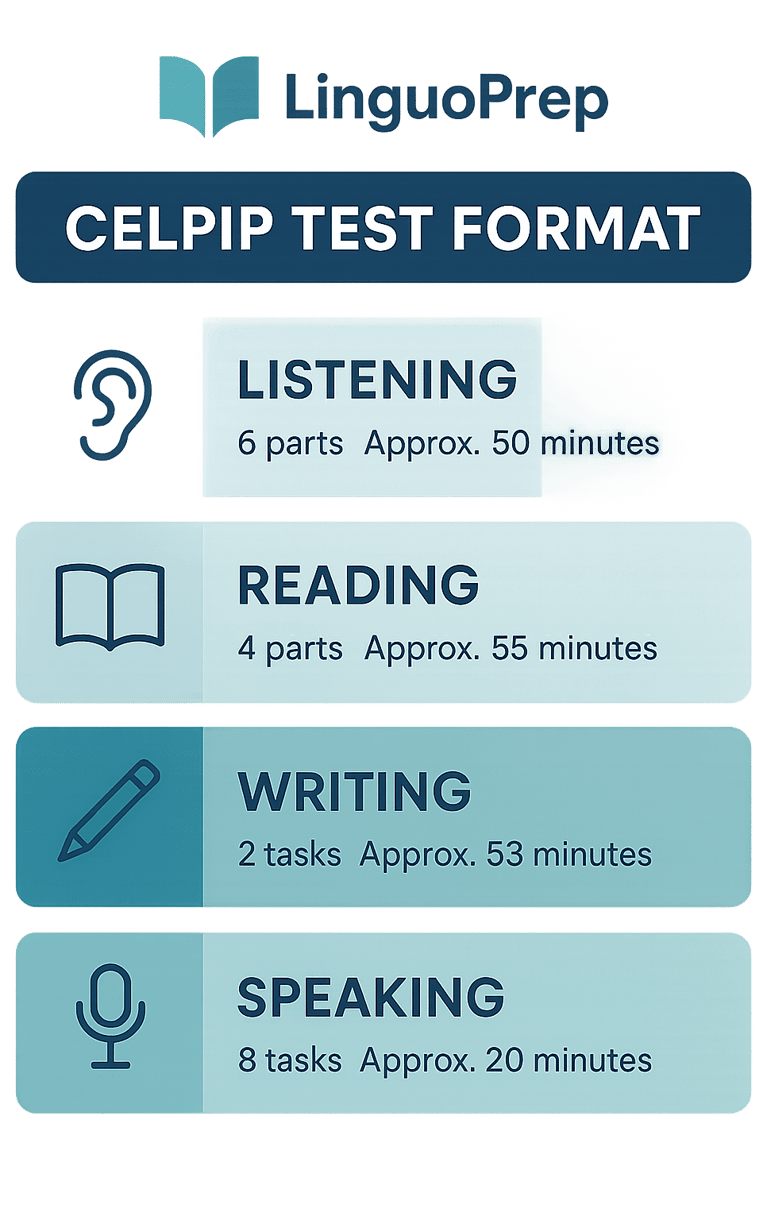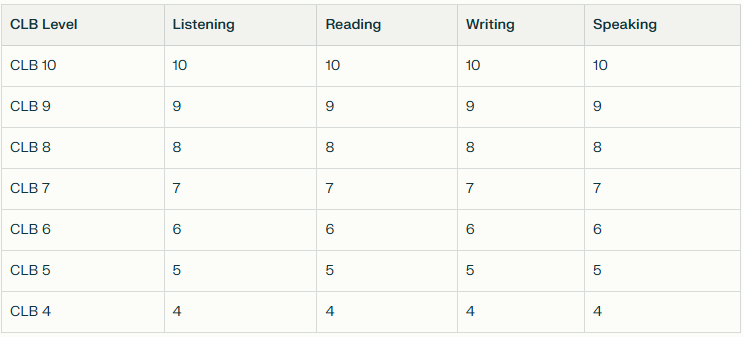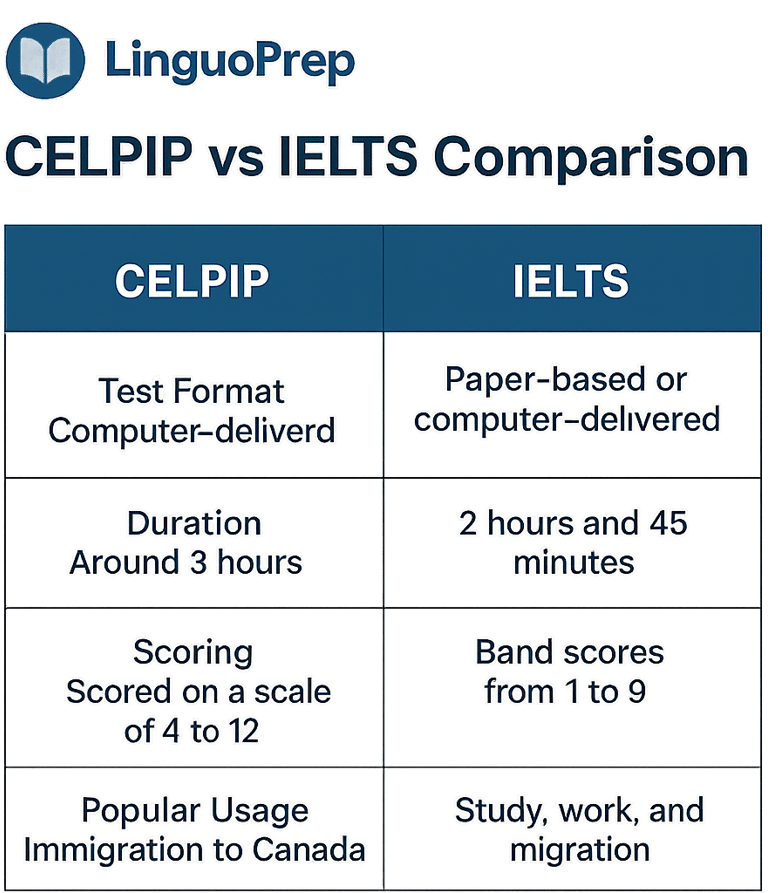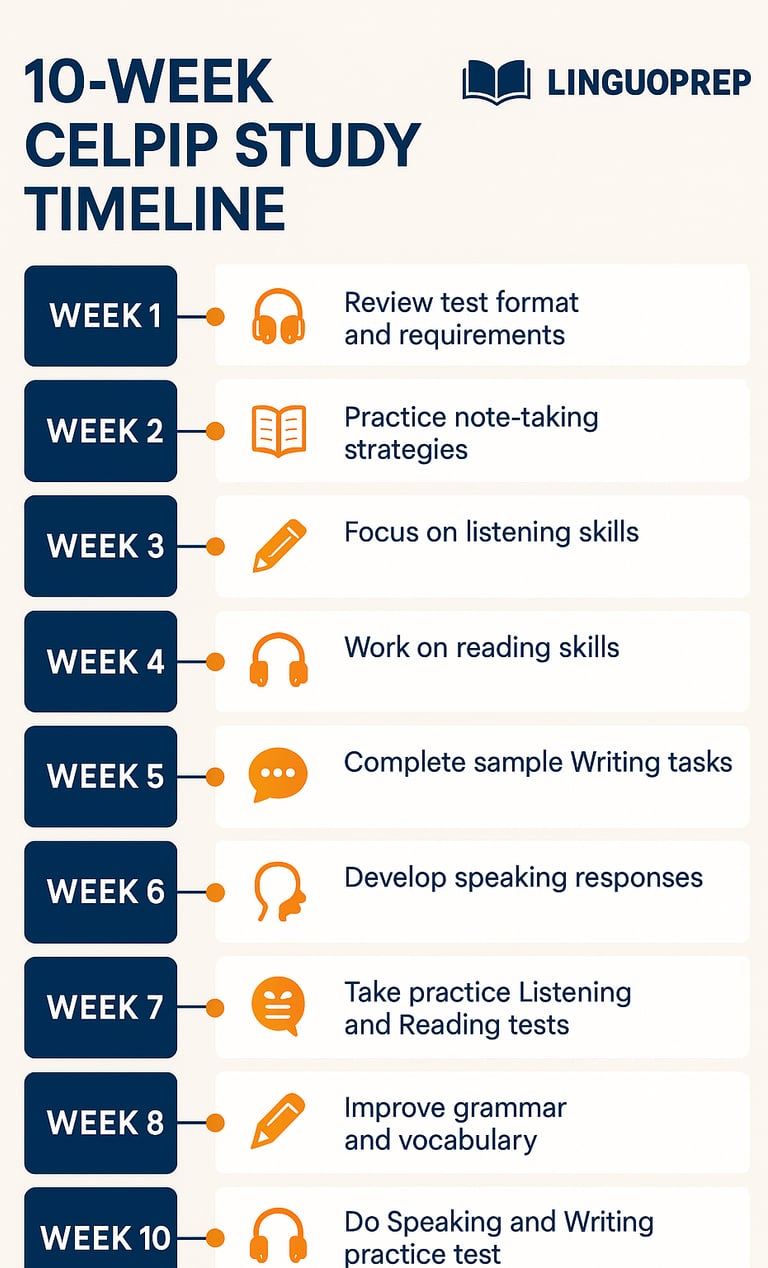CELPIP 2025 Complete Guide: Format, CLB Conversion, Section-wise Strategies, and 10 Week Study Plan
The CELPIP Canadian English Language Proficiency Index Program) is Canada's premier computer-based English language test designed specifically for Canadian immigration, citizenship, and professional registration. This comprehensive 2025 guide covers the updated test format, CLB mapping, section-wise strategies with proven templates, common mistakes to avoid, a structured 10-week preparation plan, and the best official and free resources to help you confidently target CLB 9+ scores for competitive Express Entry applications.
CELPIP
swati
9/1/20256 min read


CELPIP 2025 Test Variants and Complete Format
Test Variants Overview
CELPIP General is the comprehensive assessment used for permanent residence applications and most immigration pathways. It evaluates all four language skills: Listening, Reading, Writing, and Speaking, taking approximately 3 hours in a single sitting at an authorized test center.
Official Test Structure CELPIP (General)
Listening Section (47-55 minutes)
The listening component includes one practice task followed by six scored parts totaling 38 questions:
Part 1 Listening to Problem Solving 8 questions)
Part 2 Listening to Daily Life Conversation 5 questions)
Part 3 Listening for Information 6 questions)
Part 4 Listening to News Item 5 questions)
Part 5 Listening to Discussion 8 questions)
Part 6 Listening to Viewpoints 6 questions)
Reading Section (55-60 minutes)
The reading section contains one practice task plus four parts with 38 total questions:
Part 1 Reading Correspondence 11 questions, 11 minutes)
Part 2 Reading to Apply a Diagram 8 questions, 9 minutes)
Part 3 Reading for Information 9 questions, 10 minutes)
Part 4 Reading for Viewpoints 10 questions, 13 minutes)
CELPIP to CLB Conversion Chart
Section-Wise Strategies and Templates
Scoring Goals and Benchmarks
For Express Entry competitiveness, target CLB 9 across all four abilities. This benchmark unlocks maximum language points and enables additional CRS points through various skill transferability factors
. 6 If you're currently performing at CLB 6-7 level, plan a focused 8-12 week preparation period using section-specific templates and timed practice drills to reach CLB 9 performance consistently.
The listening section features six progressively complex parts where questions appear after the audio clips, requiring strong anticipation and note-taking skills
Core Strategies
Anticipate while listening: Focus on names, dates, locations, numbers, opinions, and tone shifts.
Develop effective shorthand: Use symbols for agreement ( ✓ / ✗ ), arrows for cause/effect relationships, and numerals for sequences.
Listen for distractors: Audio often contains self-corrections and misleading information; use elimination techniques on close options.
Maintain pacing: If you miss a question, move forward immediately to protect overall section performance.
Ready to start?
Connect with our certified CELPIP specialists at Linguoprep and book a free consultation to personalize your study plan for guaranteed results.




CELPIP General LS (Listening and Speaking) is specifically designed for Canadian citizenship applications. This shorter version takes about 1 hour and 10 minutes, focusing only on oral communication skills
Writing Section (53 minutes)
Two distinct writing tasks assess your communication abilities:
Task 1 Writing an Email 27 minutes, 150200 words) 1
Task 2 Responding to Survey Questions 26 minutes, 150200 words))
Speaking Section (15-20) minutes
Eight progressive speaking tasks evaluate various communication scenarios:
Practice Task Task 1 Giving Advice
Task 2 Personal Experience
Task 3 Describing a Scene
Task 4 Making Predictions
Task 5 Comparing and Persuading
Task 6 Difficult Situation
Task 7 Expressing Opinions
Task 8 Describing an Unusual Situation
CELPIP to CLB Conversion: Why It Matters for Immigration
Immigration, Refugees and Citizenship Canada IRCC) evaluates language proficiency using the Canadian Language Benchmark CLB) system. Your CELPIP scores directly convert to CLB levels, which determine your eligibility and point allocation in Express Entry programs.
Listening: Mastering Time, Structure, and Tactics
Practice Routine
Dedicate 15-20 minutes daily to active listening with paraphrase drills. Complete 34 full listening mock tests weekly during weeks 710 of your preparation..
The reading section contains four distinct parts requiring different approaches and careful time management per question type.
Core Strategies
Skim first, scan second: Quickly identify main ideas, then scan for specific keywords (names, dates, headings)
Master diagram tasks: For "Apply a Diagram" questions, map labels and relationships before attempting answers
Track viewpoint shifts: For opinion-based passages, monitor argument signals like "however," "therefore," and "in contrast"
Reading: Accuracy-First with Strategic Scanning
Practice Routine
Complete 2 reading passages daily with strict timing. Execute 1-2 full reading sections three times weekly during weeks 7-10.
Speaking: Master All 8 Tasks with Structure and Timing
The speaking section requires quick planning and fluent delivery. Performance is evaluated on content coherence, vocabulary range, listenability, and task fulfillment.
Universal PASE Framework:
Plan (10-15 seconds): List 2-3 key points
Answer with structure: Introduction (context/opinion), 2-3 developed points with examples, mini-summary
Speak clearly: Maintain natural pace with effective transitions (first, also, finally)
Examples: Use real, specific, easy-to-articulate details for authenticity and coherence
Task-Specific Templates:
Task 1 - Giving Advice: "Hi [Name], I understand you're [situation]. Based on my experience, I suggest [advice 1] because [reason]. Additionally, [advice 2] since [rationale]. Finally, [advice 3] to help you [benefit]. I'm confident these suggestions will help you succeed."
Task 2 - Personal Experience: Structure as Situation → Actions → Feelings → Lesson learned
Task 3 - Describing Scene: Cover foreground/background, people/actions, place/time, logical inferences
Task 4 - Making Predictions: Present evidence from context → likely outcome → implications
Task 5 - Compare & Persuade: Compare options on 2-3 criteria → recommend → explain benefits
Task 6 - Difficult Situation: Problem identification → available options → decision → justification
Task 7 - Expressing Opinion: Clear stance → two supporting reasons → concrete example → restatement
Task 8 - Unusual Situation: Setting description → unexpected element → reaction → resolution
Practice Routine
Record yourself daily for 10-15 minutes practicing different tasks. Review recordings against official rubrics and use Target 9+ materials for calibration
Time Management Strategies by Section
Effective time management is crucial for CELPIP success, as each section has strict time limits that advance automatically.
Listening: Don't over-invest in single items. Take concise notes during audio playback and answer decisively afterward.
Reading: Allocate fixed time blocks per part (9-13 minutes each). Move forward if stuck and return if time permits.
Writing: Email (27 minutes: 3 planning + 20 writing + 4 editing); Survey (26 minutes: 3 planning + 19 writing + 4 editing).
Speaking: Use preparation time to outline 2-3 bullet points. Keep introductions brief and invest most time in developing examples with supporting details
Time Management Strategies by Section
Weeks 1-2: Baseline Assessment and Fundamentals
Complete a full diagnostic mock test to identify weakest skills
Build foundational templates for Writing and Speaking sections
Establish daily listening and reading practice routines (15-20 minutes each)
Weeks 3-6: Skill Development and Targeted Practice
Listening/Reading: 4-5 focused sessions weekly; incorporate paraphrase and inference drills
Writing: Complete 2 emails + 2 surveys weekly under timed conditions; implement systematic feedback loops with performance checklists
Weeks 7-8: Full-Test Integration and Refinement
Execute 2-3 complete mock tests weekly under authentic exam conditions
Analyze error patterns systematically and intensify targeted skill drills
Stress-test time management strategies across all sections
Weeks 9-10: Exam Simulation and Final Preparation
Complete 3 full-length tests weekly to stabilize pacing and build confidence
Finalize technical and test center readiness checklist
Focus on light active recall; avoid intensive cramming in final 48 hours
10-Week CELPIP Study Plan (CLB 7 to CLB 9+)
Official and Trusted Preparation Resources
Official CELPIP Resources:
Free online sample test and practice tests
Comprehensive test format guides and webinars
CELPIP Accelerate Starter (included with registration)
Target 9+ Study Packs for advanced preparation
Official YouTube channel with recorded webinars and study tips
Additional Quality Resources:
HZad Education mock tests with detailed feedback
Gurully's real-exam simulation platform
Prep27's scored practice tests with performance tracking
CELPIP vs IELTS: Strategic Selection
Both tests are accepted by IRCC, but they serve different purposes and have distinct characteristics.
Choose CELPIP if:
Your primary goal is Canadian PR or citizenship
You prefer fully computer-based testing environments
You're comfortable with Canadian context and vocabulary
You want more detailed scoring (12-point scale vs 9-band system)
Choose IELTS if:
You need global recognition beyond Canada
You prefer paper-based testing options
You want face-to-face speaking assessment
You need more worldwide test center availability
Key Differences:
CELPIP: Canadian-focused content, computer-based, 12-point scoring, ~3 hours
IELTS: Global content, paper/computer options, 9-band scoring, ~2 hours 45 minutes
Common Mistakes to Avoid
Listening Errors:
Not taking systematic notes during audio playback
Chasing missed answers instead of moving forward
Ignoring obvious distractors and self-corrections in audio
Reading Mistakes:
Over-reading passages without strategic scanning
Failing to track viewpoint shifts in opinion-based texts
Poor time allocation across different question types
Writing Problems:
Missing email purpose, audience, or appropriate tone
Providing generic survey responses without specific examples
Weak transitions between ideas and insufficient editing time
Speaking Issues:
Monotone delivery without natural intonation
Excessive pauses and hesitation
Lack of concrete examples to support points
Going off-topic or poor time distribution across response segments
Test Day Success Checklist
Before Test Day
Confirm test center location, arrival time, and acceptable identification
Plan your route with extra travel time buffer
Complete light warm-up tasks (15-20 minutes of listening/speaking practice)
Ensure proper hydration and adequate rest the night before
At the Test Center
Arrive at least 45 minutes early (late arrivals are not admitted)
Bring original, valid ID used during registration
Store personal belongings in provided lockers (only ID allowed in test room)
Use bathroom facilities before starting (test won't be paused)
Expect some ambient noise from other test-takers; practice focus techniques
During the Test
Maintain steady pacing across all sections
Use provided headphones and note paper effectively
Apply practiced breathing and concentration techniques
Stay committed to planned time management strategies
After the Test
Record initial reflections while memory is fresh
Plan retake timeline only after focused remediation if scores fall below targets
Celebrate completing this challenging milestone in your immigration journey
This comprehensive guide provides the strategic framework and practical tools needed to achieve CLB 9+ performance on the CELPIP test. Success requires consistent practice, strategic preparation, and confident execution of proven techniques across all four language skills.




Address:
492-A, Near Krishna Mandir, Model Town Extension, Ludhiana, Punjab.
Contacts
+1 800 9170 389
info@linguoprep.com
Subscribe to our newsletter


